American Shorthair cats are incredibly popular companions. They’re strong, even-tempered, and easy to care for. The Cat Fanciers’ Association (CFA) accepted the breed in 1906, but the cats were known as Domestic Shorthair cats until 1966. Their ancestors were most likely cats that sailed with European ships to protect cargo from rodent infestations. They’re sweet and devoted, though not that interested in being picked up and carried around. Still, many happily follow their favorite people from room to room.
The breed was developed in the 19th century from North American working cats that ratted by day and cuddled with human companions at night. Since then, they’ve been selectively bred to ensure consistency in temperament and build. American Shorthair cats are medium-sized pets, weighing 8 to 12 pounds when fully grown. They have thick, dense coats and come in shades of white, brown, silver, blue, and cream. Many have gorgeous patterns; some are tri-colored and others have adorable stripes. Most have green or golden eyes. They’re typically relatively healthy, often living anywhere from 15 to 20 years.
If you’re considering welcoming an American Shorthair into your home, expect to pay $50–$200 through adoption or $500–$1500 if you buy one from a reputable breeder.
Bringing Home a New American Shorthair Cat: One-Time Costs
Most of the cost of bringing home a new American Shorthair cat involves a few one-time purchases, including food bowls, beds, litter boxes, and toys. You’ll also need to factor in adoption fees or the cost of purchasing your pet from a breeder. Remember that if you’re adopting a kitten, they’ll require several veterinary visits throughout their first year.
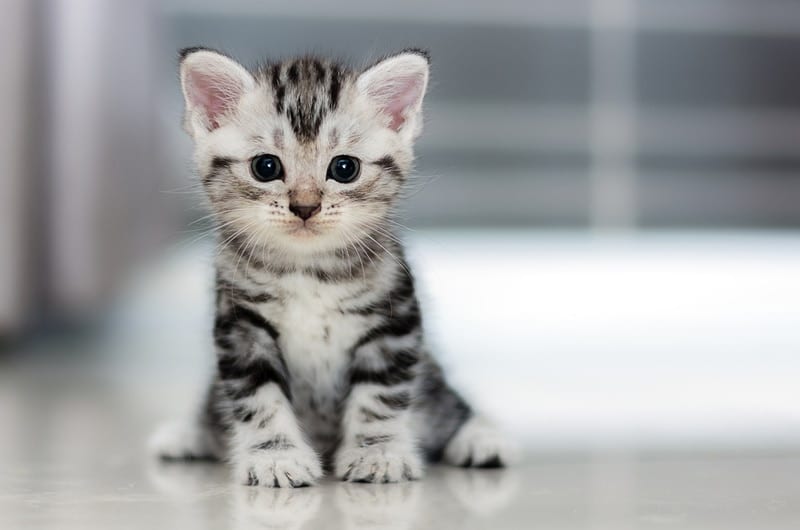
Free
It’s often possible to find cats available for adoption through informal channels. Several people find pets through friends and family members. You may be able to locate an American Shorthair cat that needs a new home on social media or through a rescue organization.
Adoption
- $50–$200
It’s sometimes possible to find purebred cats available for adoption at shelters. However, given how easy-going and adaptable these cats are, you may end up waiting quite a while for one to become available for adoption. If you find one of these cats at a shelter, expect to pay an adoption fee of anywhere from $50 to $200. Adoption fees often include the cost of an initial medical exam and any required vaccinations. Pets are usually spayed or neutered before being sent home. Kittens tend to cost more to adopt than adult cats.
Breeder
- $500–$1500+
Because these cats closely resemble Domestic Shorthair cats, working with a reputable breeder is critical to ensure you’re getting what you pay for. It’s possible to find cats for as little as $500, but plan on spending far more if you’re interested in a show-quality cat with stellar bloodlines. Consider working with a breeder registered with the CFA or The International Cat Association. Alternatively, if you already have a veterinarian, they may be able to offer a few suggestions.
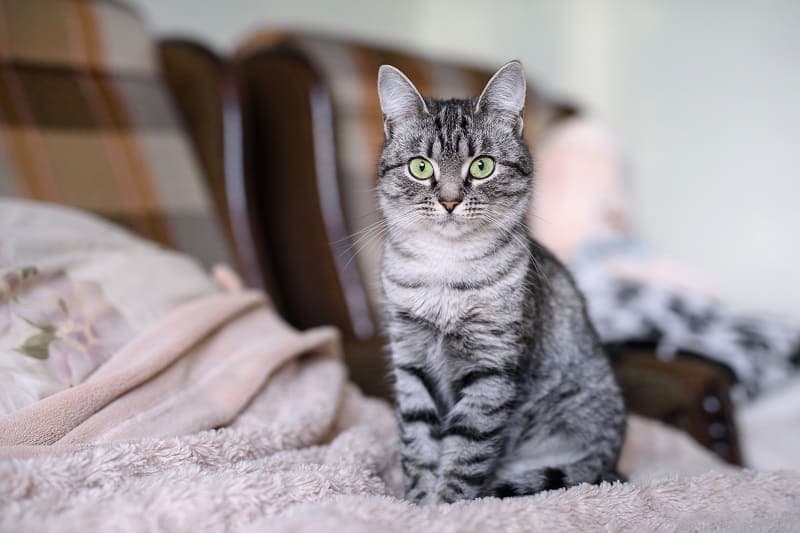
Initial Setup and Supplies
- $200–$600
Initial setup and supply costs vary based on your pet’s vaccination status and age, as kittens often require multiple veterinary visits and shots. Kittens adopted from breeders sometimes need to be microchipped and spayed or neutered. Adult cats from shelters often don’t have medical needs that drastically increase initial costs.
List of American Shorthair Cat Care Supplies and Costs
| ID Tag and Collar | $15 |
| Spay/Neuter | $50–$100 |
| Microchip | $425–$65 |
| Bed | $15–$50 |
| Nail Clipper (optional) | $7 |
| Brush (optional) | $8 |
| Litter Box | $25 |
| Litter Scoop | $10 |
| Toys | $30 |
| Carrier | $40 |
| Food and Water Bowls | $10 |
How Much Does an American Shorthair Cost Per Month?
- $120–$600 per month
American Shorthair cats are quite affordable pets! They don’t have special dietary, activity, or environmental needs, so they’re not much more expensive to keep happy and healthy than most cats! Food, healthcare, toys, and litter are a few of the recurring expenses to consider when thinking about the financial burden of pet ownership. Keep reading for more information about the costs of meeting an American Shorthair cat’s healthcare, environmental, and entertainment needs.
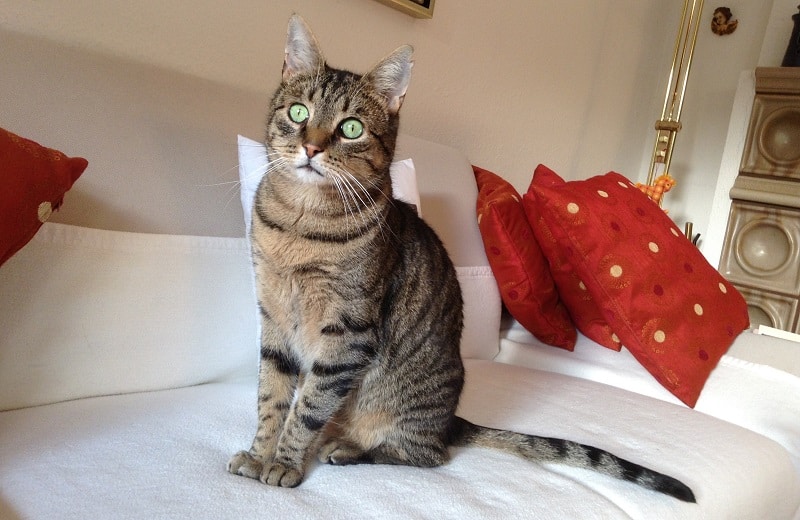
Health Care
- $75–$500 per month
Expect to spend a fair amount per month on healthcare for your cat. Kittens and older cats often have higher healthcare needs, so plan for higher bills when your companion is a kitten or older than about 7. In addition to regular veterinary visits, there are several things you can do to improve your pet’s quality of life, including providing high-quality food and ensuring their grooming needs are met.
Food
- $30–$100 per month
Cats are obligate carnivores, and their bodies are optimized to digest food from high-quality animal protein sources. Feeding cats brands that meet the American Association of Feed Control Officials requirements for nutritional adequacy ensures that cats obtain the nutrients they need. Kittens, older cats, and pets with conditions like urinary crystals and kidney disease often require special diets that cost a bit more. Several cat food companies produce high-quality choices while emphasizing transparency and sustainability.
Grooming
- $0–$25 per month
Most American Shorthair cats don’t require extensive grooming. Weekly brushing is all that’s needed to keep the gorgeous cats looking great. Cats generally don’t need help when it comes to bathing. Most only need to hit the tub when they’ve gotten into something smelly or potentially toxic. American Shorthair cats also require regular tooth brushing and nail clipping. Plan on taking your cat to the groomer to have their claws clipped every few weeks if you’re uncomfortable taking care of it on your own.
Medications and Vet Visits
- $20–$100 per month
Kittens and older cats often require more frequent veterinary attention, so plan to spend close to the high end of the range when pets are young or elderly. Kittens often require multiple vaccinations, which aren’t usually covered by pet accident and illness insurance plans. Consider purchasing a separate wellness package if you want to be reimbursed for routine medical costs such as wellness visits and vaccinations. Medication costs can add up quickly for pets with chronic conditions classified as preexisting and excluded from coverage.

Pet Insurance
- $20–$70 per month
Accident and illness plans cover unexpected situations, and they’re designed to provide financial protection from major medical bills. However, these plans often don’t pay for routine medical care such as dental cleaning and examinations. Purchasing pet insurance while cats are still young can save money in the long run. Obtaining coverage while cats are young is one of the best ways to ensure they’re not subject to preexisting condition exclusions that often leave pet owners on the hook for expensive medical treatments.
Environment Maintenance
- $30–$70 per month
Cats have a few recurring environmental maintenance requirements, including litter and the products associated with keeping their stomping grounds clean. Cats’ litter boxes should be changed at least once every few weeks. So, you’ll need a regular supply of litter. Clumpable options are popular but dusty and not great for the environment. Expect to pay more for biodegradable litter made of products such as paper, tofu, or wood. Plastic liners can make litter changes easier, and odor reducers like baking soda can limit smells.
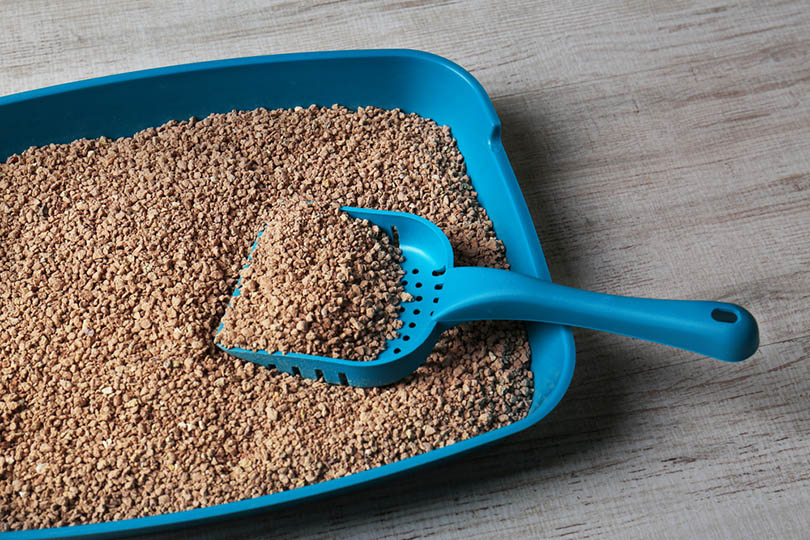
| Litter box liners | $5/month |
| Deodorizing spray or granules | $10/month |
| Cardboard Scratcher | $10/month |
Entertainment
- $10–$50 per month
Cats require mental stimulation to stay centered and engaged. Like people, cats often lose interest in toys they play with every day. Plan on regularly purchasing or making new toys for your cat to ensure they have access to fun activities. Cat toy subscription boxes are affordable and provide new toys each month.
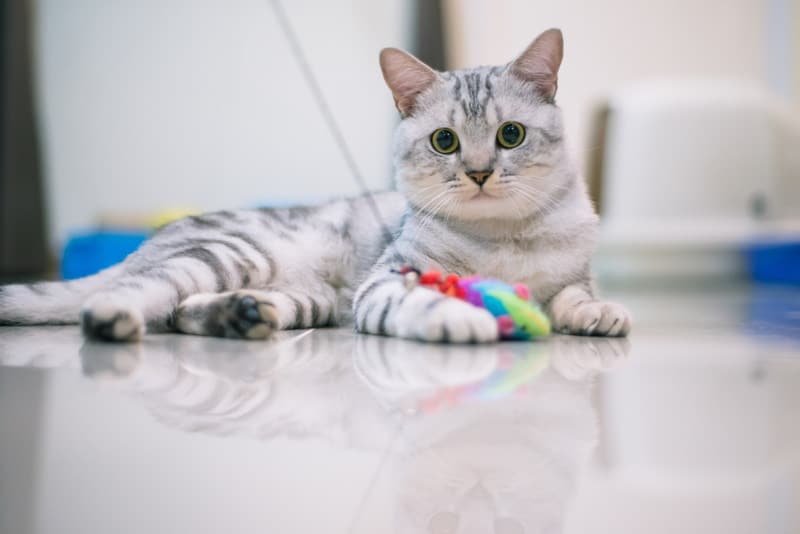
 Total Monthly Cost of Owning an American Shorthair Cat
Total Monthly Cost of Owning an American Shorthair Cat
- $120–$600 per month
Food and pet insurance are recurring monthly expenses that are impossible to get around. It’s not worth it to feed cats low-quality pet food to save a few dollars. But it’s often possible to find accident and insurance plans that allow you to adjust your deductible and reimbursement rate to keep premiums manageable. Having a rainy day fund is always a good idea to cover the things that inevitably come up when owning a cat.
Additional Costs to Factor In
If you plan on taking a vacation, remember to consider the cost of having a pet sitter take care of your cat while you’re away. Take a good look at your pet insurance policy and ensure you understand what’s covered. Make sure you have enough money in the bank to cover deductibles, medication, and checkups that are often excluded from accident and illness coverage. If your cat needs alternative or behavioral therapy, you may be on the hook for that as well. While you’re at it, add a few extra dollars to cover those inevitable incidents of accidental property destruction. You may need to reupholster a sofa or replace a scratched-up chair.
 Owning an American Shorthair Cat on a Budget
Owning an American Shorthair Cat on a Budget
Making DIY toys and enrichment activities for your cat can be fun and great for your pocketbook. You can make many DIY toys using items you probably already have at home, such as old cardboard boxes and t-shirts you’re getting ready to throw away. It’s possible to make quick and easy toys from toilet paper rolls and cat beds by adding an old towel to the bottom of a cardboard box. Cats often prefer to play with items that are already around the house.
Saving Money on American Shorthair Cat Care
You can search for online coupons and promotional discounts to save money on pet supplies and save on veterinary bills by maintaining your cat’s grooming and healthy lifestyle.
Giving your cat appropriate amounts of high-quality cat food is the absolute best thing you can do to ensure they stay in top shape and don’t develop chronic conditions such as heart disease and diabetes.
Brushing your cat’s teeth at least three times per week and ensuring their nails are regularly trimmed can help prevent the development of dental disease and ingrown nails. Dental cleanings are often expensive, and many pet accident and illness plans exclude them from coverage. Keeping your pet’s claws clipped is an easy way to prevent ingrown nails, which often require a trip to the veterinarian.
Conclusion
American Shorthair cats are remarkable pets. They’re pedigree versions of North American working cats. The ancestors of these cats were most likely ships’ cats, tasked with keeping rodents under control while at sea. They’re medium-sized kitties with sturdy builds and lush, dense coats. While they love to be around people, most can entertain themselves.
If you’re considering adopting or purchasing one of these loving animals, expect to spend around $120 to $600 monthly on things like food, pet insurance, litter, and toys. American Shorthair cats are generally healthy, and most don’t have significant dietary or other special needs. They’re special cats and don’t cost more than the average kitty to keep happy and healthy.
Featured Image Credit: Apisit Hrpp, Shutterstock
Contents
- Bringing Home a New American Shorthair Cat: One-Time Costs
- List of American Shorthair Cat Care Supplies and Costs
- How Much Does an American Shorthair Cost Per Month?
- Total Monthly Cost of Owning an American Shorthair Cat
- Additional Costs to Factor In
- Owning an American Shorthair Cat on a Budget
- Conclusion

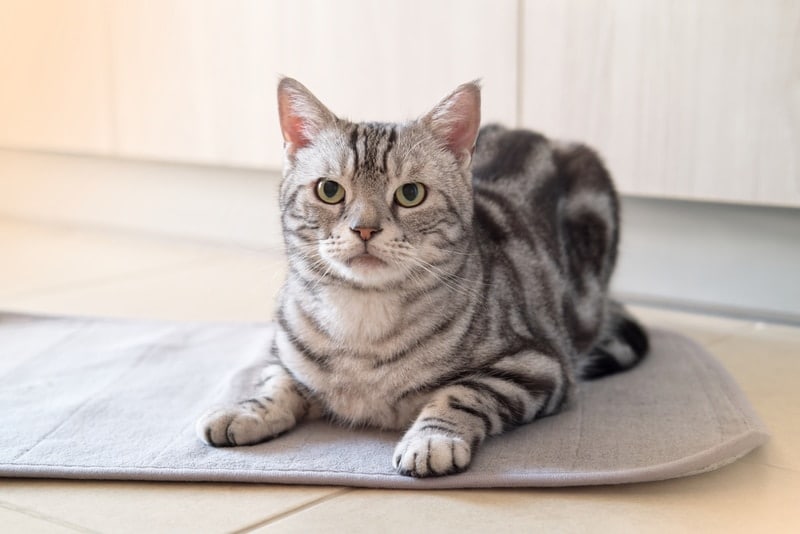

 Total Monthly Cost of Owning an American Shorthair Cat
Total Monthly Cost of Owning an American Shorthair Cat






